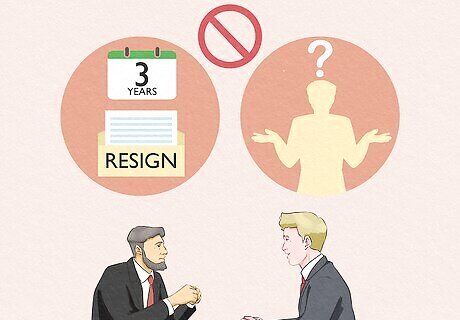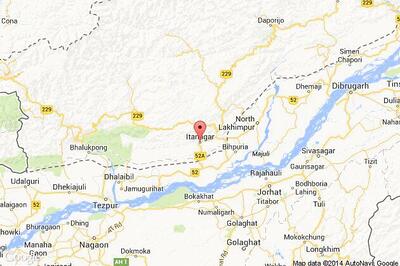
views
How to Reply During an Interview

Think through your short- and long-term goals ahead of time. It’s impossible to know exactly what the future holds, but thinking through your ideal plans (and how you’ll achieve them) before your interview gives you a clear-eyed view of what you want from your career. Getting this job may be step 1 of your professional 5-year plan, but what comes next? Where do you want to end up, and what skills will you need to get there? These questions are the foundation of your answer. If you have a goal in mind but aren’t sure how to get there, connect with a mentor in your field who can offer insight into viable career paths and helpful skills to acquire.

Reflect on your interests and how they might impact this role or company. Highlight how your professional interests, talents, or experience complement the company’s strategic goals. This links your career trajectory with the company’s achievement, which is enticing for employers to hear. Briefly explain how your skills might benefit the business down the road: For example: “In 5 years, I hope to build on my experience expanding organizations into new countries and introduce this company to entirely new and exciting markets.” You don’t want to spend too much time in your interview rehashing your experience—that’s what a strong resume is for! Resume.io has over 500 resume templates to perfectly highlight your unique experience. Plus, they’ll automatically send your resumes to recruiters to streamline your job search and get you in a new role fast.

Show you’re interested in the specific role or company you’re applying to. Even if you’re just looking for any job to tide you over, your answer should not indicate that you’re likely to leave the company anytime soon. Instead, show that you understand the trajectory of the role, the company and its culture, or the general industry and that you see yourself being a part of it 5 years down the road. This shows that you have realistic expectations and the intelligence to plan appropriately for the future. For example: “In 5 years, I hope to still be here and advance to a strategic and creative role. I understand that such positions require extensive institutional knowledge, so I plan to use the next several years to learn as much as I can in preparation for a leadership role eventually.”

Be general and focus on skills, competencies, and experiences you want to gain. Consider which experiences you want to be able to highlight on your resume in 5 years instead of specific titles or accomplishments. While these concrete goals are valuable, an answer that highlights your broader aspirations and flexibility is often more impactful. Consider the wider impact you want to make and how you picture yourself evolving in the field or company. For example: “By the 5-year mark, I plan to have gained firsthand experience facilitating company mergers. I hope my understanding of the short- and long-term benefits and challenges of these mergers will help solve tangible logistical issues and make a positive impact on both parties.”

Connect your short-term goals and successes with your long-term ambitions. If you’re not sure that your ultimate career goal will keep you at this company forever, explain how your short-term goals will both positively impact the company while you’re there and help you land your dream job. These types of answers show a willingness to learn and grow wherever you are, as well as ambition to improve and bring more value to the organization. For example: “In the long term, I hope to implement a managerial philosophy that values the work-life balance and needs of my employees, here or at another company. To do that, I first need to learn the ins and outs of empathetic management by coming into this role and exploring ways to make real, meaningful differences in my colleagues’ work lives.” A solid cover letter can also help you explain to employers why this job is crucial to your long-term career development. Resume.io has over 350 cover letter examples and expert guides to help you craft the perfect, must-hire professional narrative. Try their cover letter builder tool today and send out your strongest application yet in just minutes!

Be honest, genuine, and realistic about your plans. Speak truthfully about your goals and ambitions, but recognize that many entry- or mid-level positions don’t offer much flexibility or autonomy at first. You may wish to be a VP with a flexible schedule and decision-making authority in 5 years, but that might not be a practical expectation in many cases. Instead, describe the realistic milestones or achievements you hope to accomplish that will set you on your dream career path. For example: “In 5 years, I plan to gain mid-level managerial experience that will help me become an effective mentor in a leadership role later on in my career.”
Sample Answers
Answer ideas for anybody Use these sample answers as a template or starting point for crafting your answer. Feel free to add additional details that relate to the company’s specific mission or your career goals. “In 5 years, I see myself becoming a leader in the [your industry] space. To get there, I hope to learn more about [specific skills and experiences] over the next several years by driving success at [company name].” “Over the next 5 years, I want to hone my [industry skills] even more so that I can make an impact in the field, including [goals related to the company’s mission].” “Right now, I very much enjoy [ways you contribute to your industry]. I plan to continue doing that while challenging myself to grow in new ways, including [examples].” “I’m interested in applying my passion for [broad description of your skills] to make tangible differences in our communities, especially by working with organizations that also value [company’s value that you support or align with].” “I’m excited by the direction [your industry] is going right now. In 5 years, I hope to continue improving [your skill set] and becoming an expert so that I can ultimately [professional goal that aligns with the role or job description].”
Answers for students, recent graduates, and entry-level positions If you’re still in school or looking for your first full-time or entry-level job, use these templates to explain your interests and what you hope to explore and accomplish as you navigate the professional world for the first time. “I’m excited to apply all the knowledge I’ve accumulated in school to real-world problems and processes. In 5 years, I hope to have gained ownership of my skills and expertise in [your field] to streamline processes and make [service the company provides] accessible to a wider base.” “Over the next 5 years, I plan to enthusiastically explore what makes [company name] work so well by mastering my duties as [entry-level position]. With that experience, I plan to move up to a managerial position where I can mentor new hires and others interested in [your field].” “One day, I hope to be a leader in [your industry]. To get there, I plan to use the next 5 years to fill in my experience gaps with [specific skills or certifications you need] at a trailblazing company like [company name].”
Answers for senior positions If you’ve already got industry experience and skills, your answer will be a bit different from someone fresh out of college. Highlight your most relevant talents and experiences and explain how they’ll help both you and the organization advance in the coming years. “I’ve spent much of my career so far expanding public access to [your industry or product]. In the next 5 years, I’d like to work toward making outreach a permanent and mutually beneficial facet of [your industry or the company’s mission] to ensure long-term community engagement and organizational growth.” “I’ve been lucky to have some amazing mentors in my career who have helped me lead with both compassion and efficiency. Going forward, I hope to make a name for myself in [your industry] as an effective manager who balances their employees’ and company’s needs while mentoring others to lead with a similar human-centered approach.”
What to Avoid In Your Answer

Steer clear of these common pitfalls in your answer. What you choose to include depends largely on your career goals and the position at hand. However, there are a few things you don’t want to include or say. Consider these helpful “don’ts”: Don’t indicate you’re likely to leave the company within a few years. Don’t say “I don’t know,” since it shows that you haven’t thoughtfully considered your career advancement. Don’t say “In a more senior position than this one.” It implies you’re only thinking about advancement or promotion rather than the role you’re interviewing for. Don’t say “In a different department or role.” Why are you interviewing for this position if it isn’t what you want? Don’t say “In your position.” While confident-sounding, this answer can come off as a bit aggressive or ignorant of what it takes to advance at the company. Don’t get overly specific with titles or accomplishments. This might be interpreted as a narrow or rigid view of your career path without room for growth or flexibility. Don’t forget to connect your answer with the specific company’s values and mission. Show you want to work for them specifically.
Craft Your Next Resume for Free with Resume.io

Take advantage of Resume.io’s free services or upgrade to a premium account. Resume.io is the best resume builder worldwide that actually gets you the job. They connect you to recruiters in your industry, prepare you for interviews, and have a team of specialists apply to jobs on your behalf. You can even hire a coach for personalized guidance if you feel that you’re struggling in your search! But don’t take our word for it—you can try out their services yourself without paying a dime. Their free services include: Access to their resume builder tool to design your resume from scratch. Download your resume as a PDF or in their popular Vancouver format. Cover letter writing services with pre-generated sentences and expert tips. The ability to share online links to your resume. Access to their library of real sample resumes. Access to their free job search tool. Impressed? You can upgrade to a 7-day free trial of a premium account, which allows you to make unlimited resumes and cover letters in any of their expertly designed templates.
How to Answer If You’re Changing Careers

Focus on the general direction you want to go while being open to new opportunities. If you’re in the midst of a career change (or if you just plain don’t know what you want to do with your career at the moment), that’s OK! Demonstrate that you’re adaptable and open to new experiences while you pursue your professional interests. For example: “I’m focused on growing my expertise in science communication, and in five years I hope to be applying that knowledge in a public-facing setting. I’m open to exploring new roles or industries that intersect with science literacy and education, so while I have a general path now, I’m excited to see where the next few years take me.”
Why do interviewers ask this question?
To see if your expectations and goals align with the role Employers want to know if your ideal career path and goals align with what the company does and is able to offer. This is a gauge of whether you’ll be interested in improving or sticking around long-term, but also of whether the company will be able to be a good manager for you and your career growth.
To see if you’ll stick with the company for at least 5 years It makes sense that employers would try to avoid short-term hires. It takes time, money, and resources to find and train new employees, and your interviewer is likely trying to gauge whether you plan to stick around long-term. If your answer shows that your ultimate goals don’t align with what the company can offer, they may assume you’ll always have one foot out the door and leave as soon as a better opportunity pops up.
To see if you’re ambitious Do you have a growth mindset that shows you’re dedicated to learning and evolving? Even if you’re not 100% sure what your future career path looks like, give an answer that reveals your willingness to grow and adapt (and therefore, be valuable to the company). Responses that show flexibility and ambition balance your confidence in your current skills with the humble acknowledgment that you have more to learn and explore. A strong interview paired with a clear and polished resume shows employers you have what it takes to advance in your field. Craft unlimited, industry-standard resumes and cover letters with Resume.io’s AI-powered resume builder to stand out from the crowd and highlight your valuable expertise.
To gauge your genuine interest in the role Are you applying for any old job until something better comes along, or are you specifically interested in advancing within this company or field? While your motivations are your own, employers want to see that you’re dedicated to performing your best and exploring genuine career goals in the role you’re interviewing for.

















Comments
0 comment